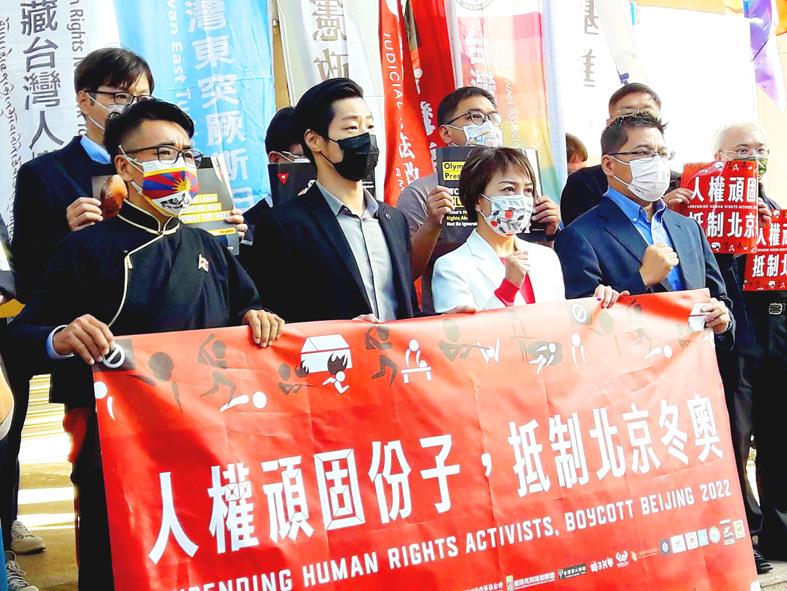China welcomes Taiwan’s participation in the Beijing Winter Olympics under the name Chinese Taipei, but would likely do everything in its power to insinuate it is part of “one China,” a national security official said yesterday.
Ahead of the Games’ scheduled to start on Feb. 4, Chinese Olympic Committee Secretary-General Song Keqin (宋克勤) has reportedly outlined Beijing’s plan for how to portray Taiwan and its athletes.
It is reportedly to respect a 1981 agreement that allows Taiwan’s participation in international sporting events under the name Chinese Taipei, as well as offer wildcard entry to Taiwanese athletes who fail to qualify.

Photo: CNA
A video has also reportedly been made featuring Taiwanese living in Beijing lauding the Games.
However, a national security official raised concern over Beijing’s supposed plan for the Parade of Nations during the opening and closing ceremonies.
As in the 2008 Beijing Summer Games, national teams are to enter the stadium according to the first simplified character of their title in Chinese.
China, as the host country, enters last, while Taiwan would enter relatively early according to the first character in Chinese Taipei (中華台北).
However, an official with knowledge of the matter said that Beijing plans to have Taiwan march alongside teams from Hong Kong and Macau, which would officially have “China” at the beginning of their title.
This is intended to emphasize its idea of “one China” by having the three teams enter together, he said.
China Central Television also plans to announce the team in Chinese as its version of “Chinese Taipei” (中國台北), which does away with the ambiguity of the official title, while echoing its names for Hong Kong and Macau, the official added.
This expected move is likely a response to Japanese broadcaster NHK’s introduction of the nation as “Taiwan” during this summer’s Tokyo Olympics, he said.
In addition, China is likely to use its influence as host nation to increase Taiwan’s visibility in the Games and recruit Taiwanese volunteers, all with the goal of promoting its vision of national rejuvenation through unification, the official said.
In light of China’s relentless intimidation and its known plans for the Games, “it would be a disgrace” if Taiwan still decides to participate, he added.
Under the 1981 agreement signed in Lausanne, Switzerland, with the International Olympic Committee, Taiwan participates in the Games under the name Chinese Taipei and the Chinese Taipei Olympic flag.
Eight years later, Beijing and Taipei met in Hong Kong to settle on the Chinese name “Chinese Taipei” (中華台北) for all Olympics-related materials.
However, in China’s view, as expressed ahead of the 2008 Beijing Games, the agreement does not apply to organizations outside of the Olympic system, such as Chinese media.
The US earlier this month said it would stage a diplomatic boycott of the Games.
When asked if Taiwan would follow suit, the Presidential Office said that an “appropriate response” would be made after ensuring that athletes’ participation would not be affected.
Additional reporting by CNA

Chinese Nationalist Party (KMT) Chairman Eric Chu (朱立倫), spokeswoman Yang Chih-yu (楊智伃) and Legislator Hsieh Lung-chieh (謝龍介) would be summoned by police for questioning for leading an illegal assembly on Thursday evening last week, Minister of the Interior Liu Shyh-fang (劉世芳) said today. The three KMT officials led an assembly outside the Taipei City Prosecutors’ Office, a restricted area where public assembly is not allowed, protesting the questioning of several KMT staff and searches of KMT headquarters and offices in a recall petition forgery case. Chu, Yang and Hsieh are all suspected of contravening the Assembly and Parade Act (集會遊行法) by holding

PRAISE: Japanese visitor Takashi Kubota said the Taiwanese temple architecture images showcased in the AI Art Gallery were the most impressive displays he saw Taiwan does not have an official pavilion at the World Expo in Osaka, Japan, because of its diplomatic predicament, but the government-backed Tech World pavilion is drawing interest with its unique recreations of works by Taiwanese artists. The pavilion features an artificial intelligence (AI)-based art gallery showcasing works of famous Taiwanese artists from the Japanese colonial period using innovative technologies. Among its main simulated displays are Eastern gouache paintings by Chen Chin (陳進), Lin Yu-shan (林玉山) and Kuo Hsueh-hu (郭雪湖), who were the three young Taiwanese painters selected for the East Asian Painting exhibition in 1927. Gouache is a water-based

Taiwan would welcome the return of Honduras as a diplomatic ally if its next president decides to make such a move, Minister of Foreign Affairs Lin Chia-lung (林佳龍) said yesterday. “Of course, we would welcome Honduras if they want to restore diplomatic ties with Taiwan after their elections,” Lin said at a meeting of the legislature’s Foreign Affairs and National Defense Committee, when asked to comment on statements made by two of the three Honduran presidential candidates during the presidential campaign in the Central American country. Taiwan is paying close attention to the region as a whole in the wake of a

OFF-TARGET: More than 30,000 participants were expected to take part in the Games next month, but only 6,550 foreign and 19,400 Taiwanese athletes have registered Taipei city councilors yesterday blasted the organizers of next month’s World Masters Games over sudden timetable and venue changes, which they said have caused thousands of participants to back out of the international sporting event, among other organizational issues. They also cited visa delays and political interference by China as reasons many foreign athletes are requesting refunds for the event, to be held from May 17 to 30. Jointly organized by the Taipei and New Taipei City governments, the games have been rocked by numerous controversies since preparations began in 2020. Taipei City Councilor Lin Yen-feng (林延鳳) said yesterday that new measures by